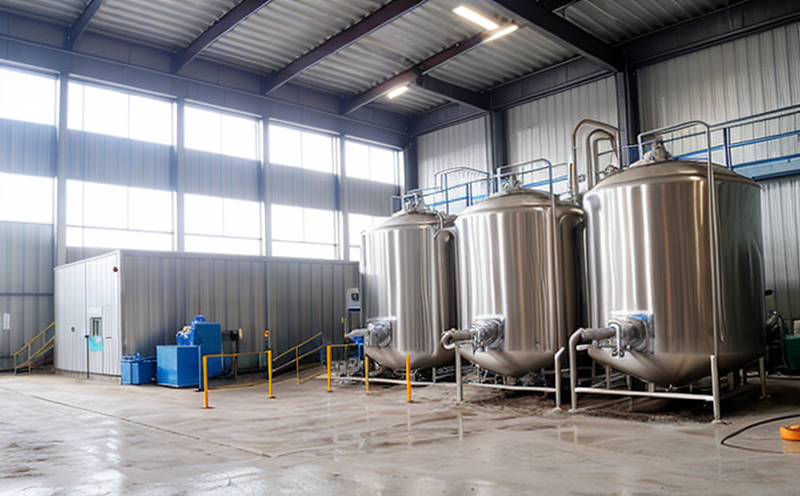APHA 9222B Total Coliform Membrane Filter Test in Process Water
The APHA Standard Method 9222B, also known as the Total Coliform Membrane Filter Test (MFT), is a critical tool used to assess the quality of water used within industrial processes. This method detects total coliform bacteria, which are an indicator species for fecal contamination in process waters. Understanding and implementing this test can significantly enhance the safety and efficiency of industrial operations.
The test involves filtering a specified volume of process water through membrane filters. The filters are then incubated under controlled conditions to allow any present coliforms to grow. Following this, the filter is examined for the presence of colonies that match the characteristics of total coliforms. This method provides a reliable and sensitive means of detecting even low levels of contamination.
The importance of this test extends beyond mere compliance with regulatory standards; it also plays a vital role in ensuring product quality and safety. By identifying potential sources of contamination early, industrial processes can be optimized to reduce downtime and ensure consistent performance. This is particularly crucial for industries where water quality directly impacts the final product or service.
The APHA 9222B test is widely accepted globally due to its robustness and reliability. It aligns with international standards such as ISO, ASTM, EN, and IEC, ensuring that results are comparable across different laboratories worldwide. This consistency in methodology is essential for maintaining high-quality industrial processes.
For R&D engineers, this test provides valuable insights into the effectiveness of water treatment methods. By identifying potential areas of improvement in filtration systems or disinfection protocols, these professionals can innovate and refine their approaches to ensure optimal performance.
The MFT is also an indispensable tool for quality managers responsible for ensuring compliance with local regulations and corporate standards. It helps them make informed decisions regarding process adjustments that could lead to better operational efficiency and reduced environmental impact.
Compliance officers benefit from this test by providing them with data-driven evidence of adherence to legal requirements, thereby reducing the risk of penalties or reputational damage associated with non-compliance.
Why Choose This Test
The APHA 9222B Total Coliform Membrane Filter Test in Process Water is a cornerstone for maintaining the quality and safety of industrial process waters. Here are several key reasons why this test should be a priority:
- Achieving Regulatory Compliance: This method ensures that water used in various industries adheres to stringent regulatory standards such as those set by local authorities, EPA, WHO, and other governing bodies.
- Enhanced Product Quality: By detecting total coliforms early on, this test helps prevent contamination issues that could compromise the quality of products or services derived from these waters.
- Improved Operational Efficiency: Early detection allows for timely adjustments in water treatment processes, leading to reduced downtime and increased operational efficiency.
- Environmental Protection: Ensuring water purity minimizes environmental impact by preventing pollutants from entering natural ecosystems.
The reliability of the APHA 9222B test is further enhanced by its widespread acceptance in international standards. This ensures that results obtained are universally recognized and comparable, facilitating seamless collaboration between laboratories across different regions.
International Acceptance and Recognition
The APHA 9222B Total Coliform Membrane Filter Test enjoys broad international acceptance due to its adherence to stringent quality control measures. This method aligns with several key international standards, including:
- ISO/IEC 17025:2017 – Laboratory accreditation and quality assurance.
- ASTM E2348-21 – Standard practice for performance of biological tests on water, including the MFT.
- EN ISO 9001:2015 – Quality management systems in laboratories.
- IEC 62764:2013 – Water quality – Determination of total coliforms by membrane filtration and multiple tube fermentation method.
The global recognition of this test is reflected in its use by leading organizations worldwide. This ensures that results are universally accepted, fostering trust among stakeholders involved in water quality management.
Competitive Advantage and Market Impact
The implementation of the APHA 9222B Total Coliform Membrane Filter Test offers significant competitive advantages for industries reliant on high-quality process waters. Here are some ways this test can influence market performance:
- Enhanced Reputation: Consistent compliance with stringent testing protocols enhances a company’s reputation, making it more attractive to customers and partners.
- Better Customer Satisfaction: Ensuring the safety and quality of process water leads to higher customer satisfaction rates, which can translate into increased loyalty and repeat business.
- Innovation Opportunities: Early detection capabilities provided by this test encourage continuous improvement in filtration technologies and methodologies.
- Regulatory Leadership: Adherence to robust testing methods demonstrates a company’s commitment to regulatory compliance, setting it apart from competitors.
The market impact of this method is profound. By providing reliable data on water quality, companies can make informed decisions that drive innovation and efficiency. This not only benefits the industry but also contributes positively to environmental conservation efforts.





